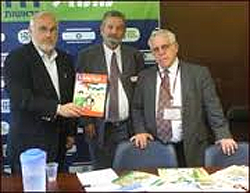Editor’s Note: The following report was commissioned by the Center for Near East Policy Research, a Jerusalem institution which publishes Israel Behind the News.
By Arnon Groiss,

JERUSALEM (CNEPR) — UNRWA – the United Nations Relief and Works Agency for the Palestinian refugees in the Middle East – was established in the wake of the Arab-Israeli war of 1948 by the UN General Assembly resolution 302 (IV) of December 8, 1948, in order to carry out relief and works programs for the Palestinian war refugees. The agency began operations on May 1, 1950. In the absence of a solution to the refugee problem, the Assembly has repeatedly renewed UNRWA’s mandate.
Over half of UNRWA’s general budget is dedicated to education (about 381 million US$ out of a total budget of close to 674 million US$ in 2012, which makes 56.55%).[1] The agency also offers health, relief and social services. UNRWA provides free-of-charge basic education to children of Palestinian refugees in the Palestinian Authority-controlled West Bank, the Hamas-controlled Gaza Strip, the Israel-controlled East Jerusalem, and in Jordan, Syria and Lebanon. In the school year of 2011/2012 it ran a total of 703 schools caring for 491,641 students. 245 of these schools were in the Gaza Strip and 99 were in the West Bank, with 225,098 and 51,695 students respectively.[2] Two of UNRWA’s West Bank schools are actually located in the greater Jerusalem area that was annexed to Israel in 1967.
Basic education means both elementary and intermediate (also called “preparatory”) schools, that is, grades 1-9 or 10, depending on the specific school system in each country. Only in Lebanon does the Agency operate some nine high schools as well, since Palestinian students of these grades find it difficult to study in local public or private schools.
UNRWA maintains close cooperation with government educational authorities in its various areas of operation. Students at UNRWA schools study the same curriculum and use the same books authorized by the host governments (except for East Jerusalem where the PA curriculum and books have been adopted for use instead of the Israeli ones). Beside the schoolbooks issued by the respective national authorities with no involvement on UNRWA’s part, the Agency has published several textbooks of its own which teach issues such as tolerance and human rights in its schools, as it testifies: “One of our key programmes promotes human rights and non-violent communication skills, conflict resolution and tolerance.”[3] However, these additional books do not usually touch sensitive issues related to the conflict such as the attitude to the “other” or the possibility of solving the conflict peacefully.
The use of books provided by the host governments in UNRWA’s school is problematic because these books sometimes contain material that contradicts UNRWA’s professed mission. Being a UN agency, UNRWA is committed to the ideal of peace and is bound by the UN’s goal of peaceful solution to the Middle East conflict. In line with this commitment, UNRWA should also refrain from propagating hate indoctrination towards any group, including ethnic and religious ones. Moreover, as a UN body, UNRWA is obliged to treat all member states equally, and never promote against any of them attitudes of non-recognition, prejudice and stereotyped portrayal, not to mention demonization. However, the books used in UNRWA’s schools in its various areas of operation often advocate an armed struggle against Israel which is denied legitimacy as a sovereign state and severely demonized.
What is the situation in the Palestinian curriculum studied at UNRWA’s schools in the West Bank and the Gaza Strip? In order to answer this question, some 150 textbooks of various subjects taught in UNRWA’s schools in these areas have been examined. These books were initially issued by the PA Ministry of Education between the years 2000-2005 and have been re-edited and/or reprinted continuously ever since. All the books cited in this paper are of the latest editions (most of them having been published in 2013) and have been in use in UNRWA-operated schools during the school year of 2013/2014.
•
Read full report in PDF, click here.
San Diego Jewish World seeks sponsorships to be placed, as this notice is, just below articles that appear on our site. This is an ideal opportunity for your corporate message or to personally remember a loved one’s contributions to our community. To inquire, call editor Donald H. Harrison at (619) 265-0808 or contact him via donald.harrison@sdjewishworld.com